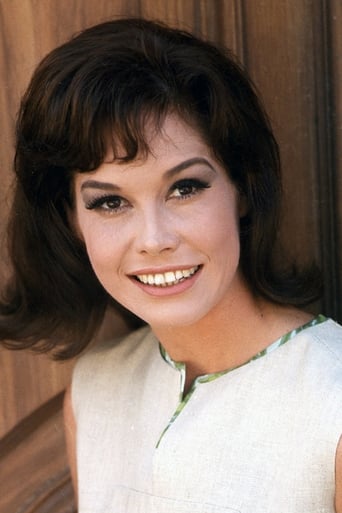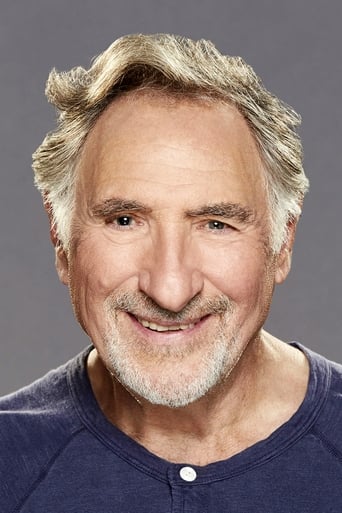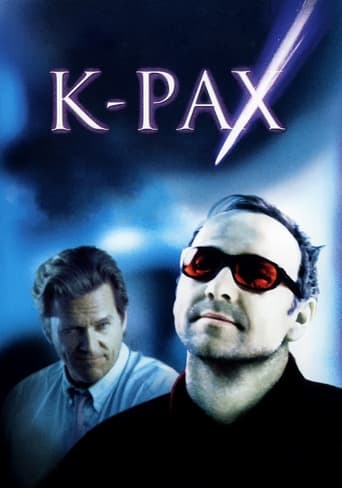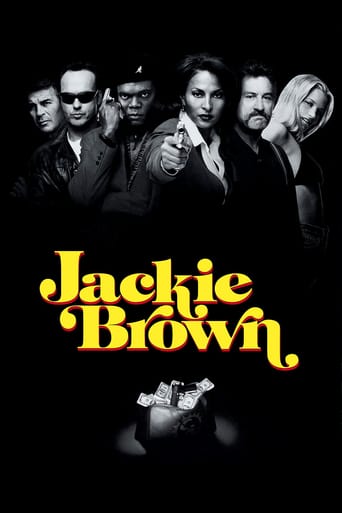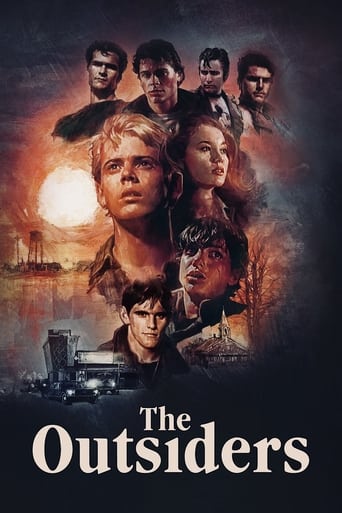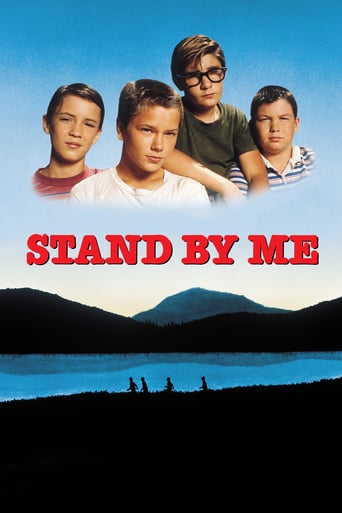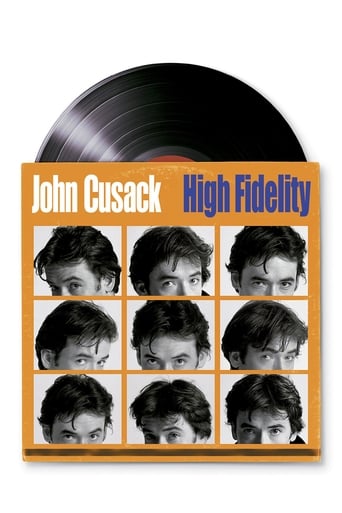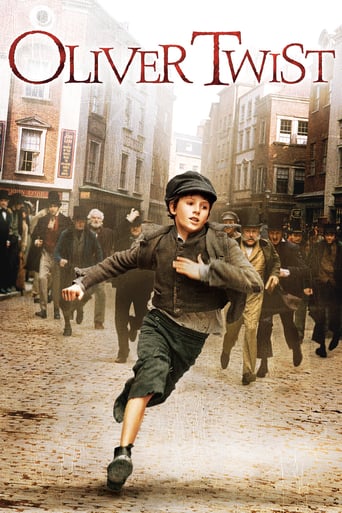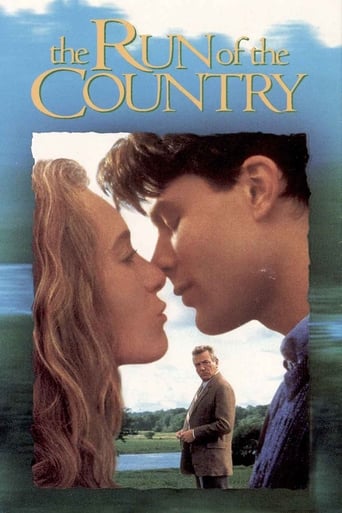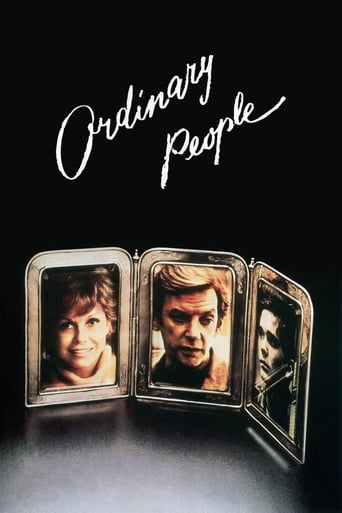
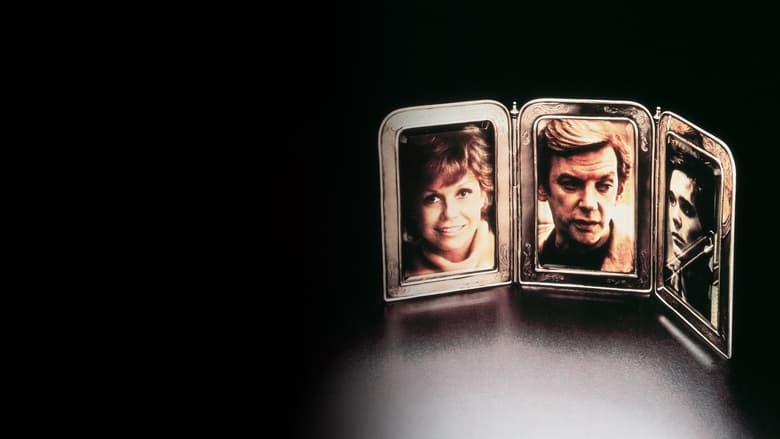
 Watch Now
Watch Now






Ordinary People (1980)
 Watch Now
Watch Now






Beth, Calvin, and their son Conrad are living in the aftermath of the death of the other son. Conrad is overcome by grief and misplaced guilt to the extent of a suicide attempt. He is in therapy. Beth had always preferred his brother and is having difficulty being supportive to Conrad. Calvin is trapped between the two trying to hold the family together.
Watch Trailer
Cast


Similar titles
Reviews
Save your money for something good and enjoyable
Brilliant and touching
If you like to be scared, if you like to laugh, and if you like to learn a thing or two at the movies, this absolutely cannot be missed.
Blistering performances.
Film Review: "Ordinary People" (1980)Based on a best-selling novel by Judith Guest, firstly published in 1976, then optioned by producer Ronald L. Schwary with an exclusive "Paramount Pictures" distribution deal, when actor turns to Academy-Award-winning directions by Robert Redford, with an immensely eye for character close-up and details in beat acting, sends his cast into a storm of emotions, where the center-theme between a relentless mother character, icely-cold as bare-to-the-bone, cleanly-sweeped portrayal by actress Mary Tyler Moore (1936-2017), who will not forgive her younger on-screen son Conrad, featuring heart-breaking Acdemy-Awarded constant-beating scene work from 18-year-old actor Timothy Hutton, whose character mentally suffers "The Impeccable" due to an inter-familiar-conviction for an accidently-committed death of the mother's first-born favorited son in a yachting boat trip, skillfully intercut within psychiatrist-chamber session alongside Academy-Award-nominated Judd Hirsch, when the only stability to a fulminate simplistic story-line on a mother preparing to leave the past and family life behind in this "Best Picture" Academy-Award winner, ruling-out visionary late black-and-white cinematic masterworks as medical-drama "The Elephant Man" directed by David Lynch and "Raging Bull" directed by Martin Scorsese, when Robert Redford's brutally-honest picture gets conceived to all-around conventional establishments agreed on March 31st 1981 at the Oscars in its 53rd Edition."Ordinary People" is a tense drama on the human condition, when the only likable character comes along with solidly-life-excepting manner playing supreme actor Donald Sutherland, whose portrayal of a loving father standing by family members in crisis, no-matter-what, does not need any public recognition to an extent that some family conditions are bound, if not to say, must break to be one's solely-full-comitted self in a forever scared lively environment, which is not mend to heal but simply to be comprehended by the person next to you.© 2018 Felix Alexander Dausend (Cinemajesty Entertainments LLC)
Contrary to the title, "Ordinary People" is about a teenager named Conrad Jarrett and his dysfunctional family who find relief in a talented new psychiatrist who goes by the name of Dr. Beger. The first part of the film takes place in Chicago while the latter portion takes place in Houston. In the broader context, one cannot help but admire how well "Ordinary People" captures the 80s. The American suburbs today look largely the same as they are portrayed in this 1980 film even after almost 40 years have passed. The sports oriented culture remains. The country clubs of the elite continue to reside in isolated affluent neighborhoods. Although the world has changed a great deal since the 80's, if one wants to truly vision what a suburban family tried to look like at this time, this film offers a rare and poignant glance. However, keeping up the appearance of normalcy can take its toll on a family.That is the main underling problem with the Jarretts at the opening of the film. Conrad is the surviving son in the Jarrett family, who's eldest son died in what is revealed to be a sailing accident. Conrad had just attempted suicide. After a stay at an institution, he begins to visit Dr. Beger who helps the adolescent overcome his clear post-traumatic stress disorder and survivor's guilt. Thanks to Dr. Beger's kind attention, Conrad's father is also able to reconnect with his struggling son and the two form a unique bond that eventually comes to heads with Conrad's mother. Conrad's mother is more concerned with maintaining a sense of normalcy and decency than confronting the dark events that happened to her precious family. This conflict of values serves as the culmination of this fascinating film that properly addresses mental illness at a time when it was not so openly discussed. It is easy to see why "Ordinary People" received so much critical acclaim, including four Academy Awards, two of which were awarded to Mary Tyler Moore and Timothy Hutton. Robert Redford won an Academy Award for best director thanks to this film. It essentially launched his career as an extraordinary directorial debut. "Ordinary People" is an important film because it confronted the misguided nature in which many American suburban families approached mental illness at the time. However, the enduring legacy of "Ordinary People" indicates that maybe mental illness will always be misunderstood in some way. Not much has changed. People will always attempt to appear "ordinary" for their neighbors without truly understanding what the word even means. After all, if it is true that mental illness affects a great majority of families at one point or another, is it not ordinary? The most powerful moment in the film happens at a McDonalds where Conrad begins to describe what it feels like to endure suicidal depression. "Uh I don't know. It was like falling into a hole. It keeps getting bigger and bigger and you can't escape. All of a sudden, it's inside and you're the hole. You're trapped. And it's all over. Something like that. It's not really scary except when you think back on it. 'Cause you know what you were feeling'".
We all deal with grief differently, it is a stress like no other in life. In this story a son is killed in a sailing accident, and we get to see how a father, mother and brother deal with the stress. Grief can unmask things about people that would otherwise remain unseen; sometimes it unveils an ugliness far beyond expectations.When one of two sons, Buck dies, his brother becomes suicidally depressed. His mother, on the other hand, pulls the old ostrich bit- head in the sand with the old "I don't want to talk about it" routine. The dopey but likable father goes all Rodney King on us with the "Can't we all just , get along?"The dialogue is what makes this movie great. When the surviving son tries to talk with his mother, it is so awkward and cringe inducing, it is hard to watch. It is obvious that the guy is struggling, and is looking for a little understanding from mom. The kid finds some understanding from a shrink, which can happen, but his mom is no help at all. She is much more worried about the way things look, than the way her son feels. "I had to find out you quit the swim team from Beth Meyerson???, WHAT WILL THE NEIGHBORS THINK?"She lives in a flat out mansion, spends her time golfing and "doing lunch", can obviously afford cosmetic surgery (wink wink), and has a great bod for a woman of her age. Yet, all she worries about is her vacations, clothing, image, in short herself. Look up "rich bitch" in the dictionary and there is an image of her, retouched of course.Some of the negative reviews I have read seem to miss the point. People react differently to grief, sometimes even in a bad way, and yes, it can be the mother who can behave badly. Granted, this is not the norm, but it does occur. That is what makes this so interesting, we get to see an unusual reaction from an unusual family member. Some viewers are so indoctrinated into the PC world of feminist scrip writing that it seems to melt they're butch-wax when they see anybody but the adult male portrayed as the villain.In this piece , the father and son are the ones with the wisdom and understanding, and it is the female that wears the black hat. This was made in 1980, and in the 90s this type of writing became practically illegal, or at least never green lighted by a studio. They don't make them like this anymore, the PC police would not approve.
In Illinois, the upper-middle-class family Jarrett is living a trauma in their lives, with the loss of their beloved son Buck followed by the attempt of suicide of his younger brother Conrad (Timothy Hutton). Conrad's father Calvin (Donald Sutherland) is a good man of few words and his mother Beth (Mary Tyler Moore) is a cold-hearted woman that loved Buck and has always been bitter and never supported Conrad, who is under therapy with Dr. Berger (Judd Hirsch). The greatest concern of Beth is to live her perfect life, denying affection to her son. Conrad blames himself for the death of his brother since they were sailing in a bad weather and when one string jammed in the block, he was not able to release it, capsizing the boat. Conrad has difficulties to reestablish his relationship with his friend and quits the swimming team of his school.When Conrad meets Karen (Dinah Manoff), who was interned with him in the same psychiatric clinic also for attempt suicide, he feels better. And when he dates the gorgeous student from the choir Jeannine (Elizabeth McGovern), he begins to see the world with other eyes. But his problem of relationship with his mother associated to the death of Karen, who committed suicide, brings him back to the rock bottom and he runs to meet Dr. Berger. Will the psychiatrist succeed in helping Conrad? "Ordinary People" is a powerful and heartbreaking drama, one of the best American dramas from the 80's. This film is also a milestone in the career of Robert Redford since it is his directorial debut. "Ordinary People" has top-notch direction and performances; the screenplay is very well-written with powerful lines. The timeless story is well-resolved with the realistic decision of the shattered Jarrett family. My vote is eight.Title (Brazil): "Gente Como a Gente" ("People Like Us")




